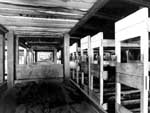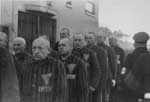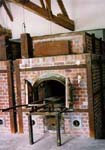|
The
arrest of father Wajszczuk
and his martyrdom at Dachau
The
arrest and the camp in Sachsenhausen
 Father
Karol Wajszczuk was arrested for the first time on the 28th of
April 1940. A black car, used by the Gestapo, with two policemen drove up at
the parish house. Having checked the priest’s identity, the Gestapo
officers demanded him to go into the car at once. The priest took his prayer
book and calmly walked to the organist, Antoni Patkowski to bid him goodbye.
To the people who had been looking at it all, he said “Remain with God”
and he left. Having testified at the Gestapo in Międzyrzec and, after that,
in Radzyń, he was freed from prison on the 29th of April and
came back to Drelów, under the condition, however, that, within three days,
he would testify once again at the Gestapo in Łuków. At that time, people
who were devoted to him, advised him not to believe the Germans and to flee
to a safe place in civilian clothes. But he did not agree to this idea, for
he had given the Gestapo “a priest’s word” that he would testify once
again. Father
Karol Wajszczuk was arrested for the first time on the 28th of
April 1940. A black car, used by the Gestapo, with two policemen drove up at
the parish house. Having checked the priest’s identity, the Gestapo
officers demanded him to go into the car at once. The priest took his prayer
book and calmly walked to the organist, Antoni Patkowski to bid him goodbye.
To the people who had been looking at it all, he said “Remain with God”
and he left. Having testified at the Gestapo in Międzyrzec and, after that,
in Radzyń, he was freed from prison on the 29th of April and
came back to Drelów, under the condition, however, that, within three days,
he would testify once again at the Gestapo in Łuków. At that time, people
who were devoted to him, advised him not to believe the Germans and to flee
to a safe place in civilian clothes. But he did not agree to this idea, for
he had given the Gestapo “a priest’s word” that he would testify once
again.
On the 2nd of May 1940, father Wajszczuk voluntarily came to the
Gestapo building in Łuków, so as to testify again. Here, he was once again
arrested and, on the 3rd of May, taken to Lublin. From the
building of the Lublin District headquarters at Uniwersytecka Street, where
he had been interrogated for several hours, he was sent to the nazi prison
at the Lublin Castle. The Lublin Castle was one of the worst places of
torment and repressive measures in occupied Poland.
When the priest's father, Piotr Wajszczuk, died in Siedlce on the 20th
of May 1940, Karol’s sister, Maria Klimczykowa, tried to ask the Gestapo
to let her brother out for the funeral. They informed her that father Karol
Wajszczuk had been driven out of Lublin. This, of course, was false
information, for the priest was driven out of the city at a later time.
 During
his stay at Castle prison, father Wajszczuk met father Stefan Ceptowski, who
will share his suffering for the next nearly two years. On the 18th
of June 1940, both the prisoners were taken by rail in freight cars to the
Sachsenhausen concentration camp, where they found themselves on the 20th
of June 1940. Father Wajszczuk was kept in Sachsenhausen until the 14th
of December 1940. He was given the prisoner’s number 25746. During his
stay there, he sent seven censored cards to his family in Siedlce and to his
friends, particularly to the organist, Patkowski, in Drelów. During
his stay at Castle prison, father Wajszczuk met father Stefan Ceptowski, who
will share his suffering for the next nearly two years. On the 18th
of June 1940, both the prisoners were taken by rail in freight cars to the
Sachsenhausen concentration camp, where they found themselves on the 20th
of June 1940. Father Wajszczuk was kept in Sachsenhausen until the 14th
of December 1940. He was given the prisoner’s number 25746. During his
stay there, he sent seven censored cards to his family in Siedlce and to his
friends, particularly to the organist, Patkowski, in Drelów.
At the same time, bad things were happening in the Drelów parish as well.
After the arrest of father Wajszczuk, serious changes were made. On the
basis of the district authorities’ dispositions from the 25th
of May 1940, the church and parish house was taken over by Ukrainian
nationalists. Horodek was given to the Poles. Father Leon Gliszczyński, who
was in charge of the parish during the parish priest’s absence, received
permission from the district authorities to dismantle the church organ. This
was done in September 1940 – the organist, Antoni Patkowski, with the help
of the parish members, took the organ to Przechodzisko, were it was stored
in the house of Bazyli and Katarzyna Olesiejuk. Father Gliszczyński took
the canopy and banners, the vestments, liturgical vessels and other objects
to Horodek.
Martyrdom
in the concentration camp in Dachau
 According
to information from the Polish Red Cross Headquarters in Warsaw, father
Wajszczuk was sent from Sachsenhausen to the concentration camp in Dachau on
the 14th of December 1940. There, he received the prison number -
22572. In this camp, the weight of an average prisoner in 1942 was around 40
kg. In February 1941, Maria Klimczykowa informed her brother, father Karol
about the events in the Drelów parish, including the arrest of the organist
– Antoni Patkowski (who died in Auschwitz on the 10th February
1942). According
to information from the Polish Red Cross Headquarters in Warsaw, father
Wajszczuk was sent from Sachsenhausen to the concentration camp in Dachau on
the 14th of December 1940. There, he received the prison number -
22572. In this camp, the weight of an average prisoner in 1942 was around 40
kg. In February 1941, Maria Klimczykowa informed her brother, father Karol
about the events in the Drelów parish, including the arrest of the organist
– Antoni Patkowski (who died in Auschwitz on the 10th February
1942).
Correspondence between the prisoner and his family was halted for a long
period – from March 1941 to the end of the year. This silence made the
family very concerned. The mother’s plea to the Germans about letting her
son out was met with a refusal. Father Wajszczuk did not know of this
refusal and awaited freedom. Letters from father Karol, from Dachau, started
coming to the family again in January 1942. In his last letter, from the 17th
of May 1942, he wrote: “I think that soon, maybe during the next week, I
shall change my place of living; I still remain here for the time being.
When I have been moved, I shall write to you and give the address”. He did
not yet know that he would be put into an “invalids’ transport”, to
die in a gas chamber. On the 28th of May, father Karol Wajszczuk
found himself in an “invalids’ transport” and, as is given by father
W. Jackiewicz, he died in that transport. The last information in the
documents bears the date of 28th May 1942, so this day has been
accepted as the day of father Karol Wajszczuk’s death in the concentration
camp in Dachau.
On the 1st of July 1942, the Command of the Concentration Camp
informed the priest’s family of his death by means of the telegraph. On
the 8th of July, the mother sent a letter to the Commander of the
camp, asking for further information about her son’s death. The answer
came on the 15th of July – it read: “In answers to Your
letter from the 8th of July this year, the Command of the
Concentration camp in Dachau informs that Your son, in spite of great care
at the hospital, died on the 1st of July 1942, at 23:00, after a
short illness, due to heart problems, insufficient blood circulation and an
inflammation of the intestines. Nothing is known of his last will. The
things he left will be sent in the following days.” The signature was
indecipherable.
Maria Klimczykowa did not believe in what he Germans had written, she
searched for the truth about her brother’s death. Jan Domagała, a former
prisoner and writer of the Dachau camp, gave M. Klimczykowa some information,
in his letter from the 31st of July 1946, which gave new light to
the problem: “invalids’ transport” meant death.
|